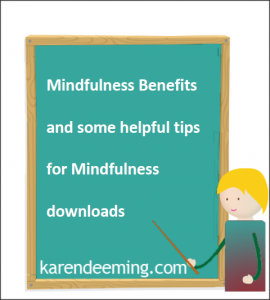According to Oxford University Mindfulness Professors, thousands of peer-reviewed scientific papers prove that mindfulness enhances mental and physical wellbeing and reduces chronic pain.
So if you want to reduce anxiety, stress, depression, exhaustion, physical pain, they all decrease with regular sessions of mindfulness exercises and meditations.
Mindfulness Benefits
Mindfulness can help you to reduce anxiety, stress, depression, and exhaustion
It can also help and teach you how to:
- improve your reaction times at home and at work
- rebalance your nervous system
- regulate your emotions and moods
- overcome exhaustion, procrastination and low-self esteem
- accept yourself for who you are
- achieve greater success levels in work and relationships
- reclaim your capacity for fun, humour, excitement and joy
Another benefit of mindfulness is that it enhances memory retention and an increase in mental and physical stamina.
Research indicates that those of us who practice mindfulness regularly are calmer, happier, more contented and less prone to psychological distress.
Some Mindfulness Tips
As well as delivering Mindfulness courses, I also find it helpful to introduce some Mindfulness techniques and ideas during individual counselling and psychotherapy sessions.
Often these clients say that whilst they find the Mindfulness downloads that I recommend they try at home helpful, they are not sure whether they are doing the Mindfulness exercises correctly so here’s what I encourage my clients to do:
1. Regardless of what happens (eg if you fall asleep, lose concentration, keep thinking of other things or focusing on the wrong bit of the body, or not feeling anything), just do it! These are your experiences in the moment. Just be aware of them.
2. If your mind is wandering a lot, simply note the thoughts (as passing events) and then bring the mind gently back to the meditation.
3. Let go of ideas of “success “, ” failure “, ” doing it well “, or “trying to purify the body “. This is not a competition. It is not a skill for which you need to strive. The only discipline involved is regular and frequent practice. Just do it with an attitude of openness and curiosity.
4. Let go of any expectations of what the mindfulness meditation will do for you. Imagine it as a seed you have just planted. The more you poke around and interfere, the less it will be able to develop. So with the meditation, just give it the right conditions – peace and quiet, regular and frequent practice. That is all. The more you try to influence what it will do for you, the less it will do.
5. Try approaching your experience in each moment with the attitude: “Ok that’s just the way things are right now “. If you try to fight off unpleasant thoughts, feelings and body sensations, the upsetting feelings will only distract you from doing anything else. Be aware, be non-striving, be in the moment, accept things as they are. Just do it.
6. When you experience a negative thought, feeling or physical sensation, breathe, pause, step back then ask yourself the following question:
“what do I know?”
“I know that if I allow my negative thoughts to take over it is not healthy for me and leaves me feeling anxious, I also know that though I can’t stop my thoughts, feelings or physical sensations, I can change what happens next, such as, consciously deciding to stop myself from catastrophising or getting too attached to my thoughts.”
“I know that thoughts aren’t facts”
I’ll end with my favourite two quotes:
“If you never give up you never fail”
“Small steps are better than no steps”



![Karen_Deeminga[1]](http://www.karendeeming.com/wp-content/uploads/2015/09/being-practice-self-portrait-e1541437891746.jpg) Welcome to my site. if you have any queries then please
Welcome to my site. if you have any queries then please

